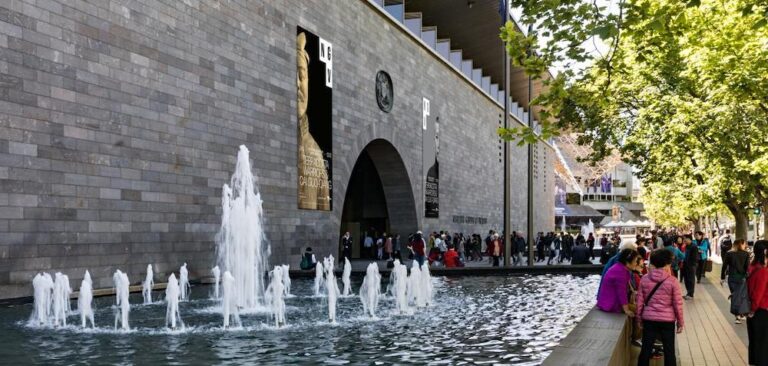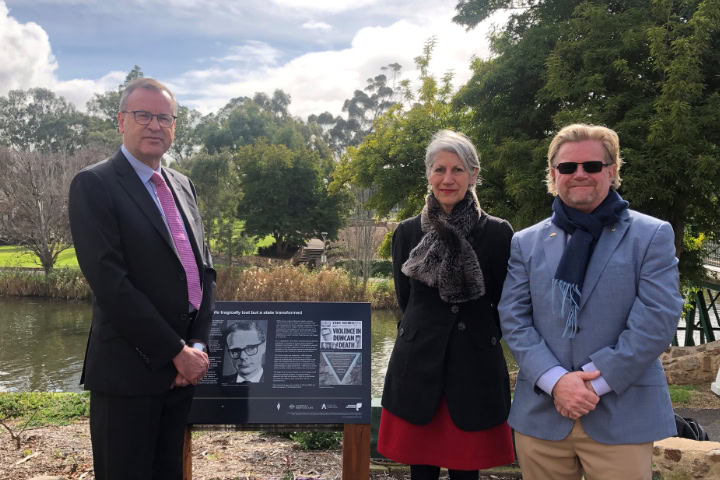
Adelaide Remembers Dr George Duncan

The City of Adelaide on Monday installed a new sign to honour the memory of Dr George Duncan, whose death in 1972 led South Australia to become the first state in the country to decriminalise homosexuality.
On July 20th, which would have been Dr Duncan’s 90th Birthday, Lord Mayor Sandy Verschoor unveiled the sign, near his memorial close to the Adelaide University on Victoria Drive.
“What happened to Dr Duncan, and the reaction to that fateful event, changed our state, and our nation, forever,” Verschoor said in a statement. “We’ve come a long way since then and the life and legacy of Dr George Duncan is an important story to tell on that journey. The Council is proud to display this sign as a reminder of the tragedy that led to the increased freedoms enjoyed by so many today.”
Dr Duncan had arrived in Adelaide and was to join as a law lecturer at the University of Adelaide on March 25, 1972, However, within two months, he had been killed. He was attacked along with another man – the assailants were suspected to be police officers – and thrown into the River Torrens where he drowned. He was 41.
Born in London in 1930, he had moved with his parents to Melbourne when he was seven. He went to the UK for further studies and returned to Australia to take up the assignment as a law lecturer.
The south bank of the river in the heart of Adelaide was a well known night-time meeting spot for gay men. On May 10, 1972, Dr Duncan and another man, Roger James, were accosted by a gang near a footbridge at the river-bank and thrown into the river. James suffered a broken ankle and swam to safety. Dr Duncan, who did not know how to swim, drowned.
The murder, shocked the community and there were rumours that police would regularly in “poofter bashing” in the area. Three vice squad police officers had refused to answer questions at the inquest and had later resigned. In 1985, after the case was reopened, three vice squad police officers were charged with manslaughter. Two of them faced trial but were acquitted.
The case remained unsolved and in 1990 police task force recommended that it should not be reopened unless there was new evidence.
Meanwhile, soon after Dr Duncan’s death and the resultant public outcry, a private member’s bill was passed in South Australian to decriminalise homosexulity. The final bill that was passed was considered by many to be a weak one. In 1975, the SA Parliament became the first jurisdiction the the country to decriminalise homosexuality. It wasn’t until two decades later in 1997 that all Australian states had decriminalised same sex relations.
A memorial plaque was installed in 2002 at the riverbank near the footbridge with the words “We will remember him.” The new sign is to the left of this plaque.
The new sign to remember Dr Duncan’s death and legacy was welcomed by the local LGBTQI community as well as students at the University of Adelaide.
“Acknowledging the tragedy of Dr George Duncan’s death is important for young queer people to learn that despite our tragic history, we are able to grow from it and gain the rights we deserve,” Kansas Bird, Vice President of the Pride Club at the University of Adelaide told Star Observer.
“In Adelaide, we have the small memorial plaque and a few spaces, such as the George Duncan Memorial Room at the University of Adelaide, that commemorate his death. But further acknowledgement of his sacrifice nationwide is not something we have ever really received. This sign is just another way for our history to become more accessible and to ensure that Dr Duncan’s brutal murder was not forgotten, even if it was never punished.”
Verschoor said the state and the city would continue to support the community.
“South Australia led the way on inclusion and that is a legacy the City of Adelaide is thrilled to continue with initiatives such as our magnificent Pride Walk, which celebrates the achievements, but also recognises the struggles of our LGBTQI community,” the Mayor said.









